Democratic Republic Of Congo
Some fifteen embassies in Kinshasa on Saturday called for "restraint" after the elections in the DRC, described as a "sham" by the opposition, which is already planning a demonstration, as the first results are just starting to come in.
"In a joint statement, the embassies of 12 European countries and Canada called on all parties (...) to continue to show restraint as the vote count continues.
On Friday evening, on X (formerly Twitter), the US embassy had also "urged all political leaders to continue to exercise restraint and resolve differences peacefully".
On Wednesday, some 44 million of the approximately 100 million inhabitants of this vast Central African country were called upon to elect their president, national and provincial deputies and communal councillors.
The incumbent president, Félix Tshisekedi, is seeking a second term against 18 other candidates, including several opposition heavyweights who had already denounced the "chaos" surrounding the vote on Wednesday.
Faced with the many logistical problems that prevented many polling stations from opening as scheduled, the electoral commission (Céni) extended the poll.
Officially, voting ended on Thursday evening, but according to local sources, voting continued in remote areas of several provinces.
For example, in the Lubero territory of North Kivu province (east), electoral material arrived by helicopter in the village of Mabuo on Saturday, before being transported on foot to four other localities (Engobo, Lenda, Bududia, Isange), Macaire Kambau Sivikunula, head of the Bapere sector, which includes these localities, told AFP.
Due to a "special dispensation" from the Céni, "voting will take place tomorrow (Sunday) at these five sites", he added.
''Great tension"
The failure to hold the vote on December 20, "interpreted as a plot", had "caused great tension" among the population, who "threatened to kill me, my family and the Céni agents who are staying with me", explained Mr. Kambau.
Félix Tshisekedi's opponents include Moïse Katumbi, former governor of the southeastern mining region of Katanga, Martin Fayulu, who claims he was robbed of victory in the 2018 election, and Denis Mukwege, winner of the Nobel Peace Prize for his work with women victims of wartime rape.
In a letter made public on Saturday, five opposition candidates, including Mr. Fayulu and Mr. Mukwege, informed the governor of Kinshasa of their intention to organize a march next Wednesday. "We will protest against the irregularities observed during the voting operations", they wrote, describing the ballot as a "sham election".
Among the observer missions, that of the African Union considered that the elections had "taken place in a relatively calm atmosphere with major logistical challenges". The American NGO Carter Center pointed to "serious irregularities" in some polling stations.
On Saturday, the "Regard citoyen" mission reported that in 21% of the polling stations observed by its teams, "some voters were refused entry without any legal basis". Conversely, in 13% of polling stations observed, people without cards and not registered on the list "were allowed to vote".
For their part, the authorities and the Céni affirm that voting was not "chaotic".
"The challenge of holding the elections on December 20 has been met, despite the difficulties inherent in a complex process involving millions of voters and over 100,000 candidates," said government spokesman Patrick Muyaya. "We are now calmly awaiting the results," he added on X.
"If some people see a glass half empty, we see a glass three quarters full", declared Denis Kadima, Chairman of the Céni, on Friday evening, just before the announcement of the very first results.
The Céni began with the Congolese diaspora, who were able to vote for the first time in five test countries. In view of the number of registered voters, who represent 0.03% of the total, these results are not significant. But Félix Tshisekedi's score of some 80% of the vote was nonetheless celebrated in certain regions where he has a strong following.
The dissemination of results is due to continue on Saturday.



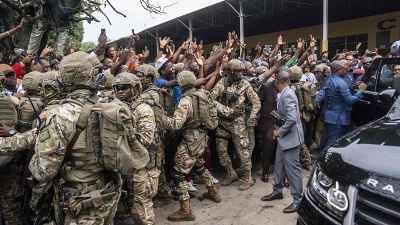

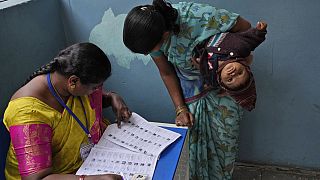
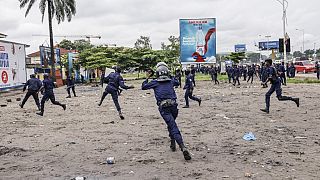
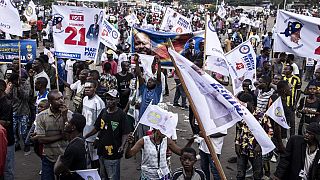

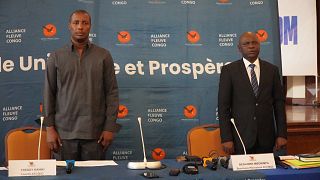
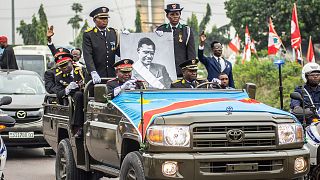



01:00
Pix of the Day: July 3, 2025
02:10
Congo-Rwanda deal: Uncertainty over whether the hostilities will end
02:13
Congo and Rwanda sign a US-mediated peace deal aimed at ending decades of bloody conflict
00:54
African Human Rights court says it can hear case brought by DRC against Rwanda
01:08
DRC extends ban on cobalt export for another three months
00:59
DR Congo's new opposition coalition launched in Kinshasa